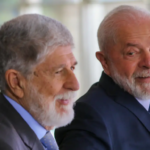
The US attempt to impose a ceasefire within seven days has increased tensions with Europe, which sees the plan as an unprecedented concession to Moscow and a direct threat to Ukrainian sovereignty.
The United States government’s abrupt and unilateral attempt to force a ceasefire in Ukraine, imposing a deadline of just seven days for Kiev to accept a new plan negotiated with Moscow, revealed a deep division between Washington and its European allies. More than a mediation effort, the American ultimatum is seen on the European continent as an “extreme concession to the Kremlin”, a maneuver that prioritizes rapid US disengagement to the detriment of Ukrainian sovereignty and regional security. The pressure put Washington, not Russia, at the center of European criticism.
Read also: Europe tries to contain US pressure on Ukraine
The deadline of next Thursday, set after the release of a 28-point plan, has put European leaders on high alert. President Volodymyr Zelenskiy, in intense dialogue with France, Germany and other European partners, sought to assess the real weight of this ultimatum, considered by many to be unfavorable. The intervention of figures such as German Chancellor Friedrich Merz, who spoke directly with Donald Trump and managed to get discussions to continue at advisor level, indicated the seriousness of the situation. Europe is desperately trying to buy time to slow down the pace demanded by the White House.
Although Secretary of State Marco Rubio tried to defuse the situation, describing the text as a “proposal to generate new ideas”, President Trump’s stance remained inflexible. When asked what would happen if Kiev did not accept, he adopted a “tough tone” and suggested he was ready to walk away from the conflict, saying of Zelenskiy: “He will have to like it — and if he doesn’t like it, then, you know, they should keep fighting, I think.” This rhetoric suggests that America’s top priority is to extricate itself from the conflict, even if that means pushing an ally to accept terms that Moscow has never been able to fully impose on the battlefield.
Profit and disengagement: American interest in the agreement
Analysis of the draft agreement, which led Europe to immediate mobilization, exposes the depth of the concessions required and the nature of American interests in the process. The plan, constructed by Americans and Russians, would require Ukraine to give up extensive occupied areas, drastically reduce its armed forces and dismantle the sanctions regime against Moscow.
The most sensitive point is recognition in fact of Crimea, Luhansk and Donetsk as Russian territories, “including by the United States”. In exchange for security guarantees — which would, ironically, be paid for by Kiev — the plan calls for the US to receive half of the profits destined for the reconstruction of Ukraine. Furthermore, lifting sanctions would pave the way for a “future economic partnership between the United States and Russia.”
Such terms suggest that the American administration is more interested in reaping economic benefits from the crisis and creating a new geopolitical relationship with Russia than in ensuring a “lasting peace” for Ukraine. Kiev’s sovereignty is treated as a bargaining chip in a major global rearrangement, with the US positioning itself to profit from both reconstruction and Moscow’s economic rehabilitation.
The future of NATO and the search for a new balance
The proposal raises crucial questions about the future of European security and the role of NATO. The document demands that Kiev definitively give up its goal of joining the alliance and reduce its military strength to levels much lower than the current ones. Furthermore, the text would limit NATO’s ability to admit new members, which would require unanimity among the 32 member states.
From the perspective of multipolar and de-escalation security, the brake on NATO expansion, although forced by an ultimatum, can be seen as a necessary step to stabilize regional tensions. However, this view is not unanimous even within the USA. Republican leaders in Congress, such as Senator Mitch McConnell, accuse government advisors of being concerned about “appeasing” the Kremlin and harshly criticize the attempt to force Ukraine to give up territory.
Although Kiev continues to impose significant losses on Russian troops, US pressure is trying to dictate an end to the conflict on its terms. The expectation is that, at the G-20 meeting in Johannesburg, European leaders will be able to build a joint strategy to resist the ultimatum and prevent the process from moving forward in such a hasty manner. For many on the continent, the solution hastily constructed by the Washington-Moscow alliance compromises the security of the entire region, handing Russia a diplomatic victory that it was unable to achieve alone.
The end result will be less about peace and more about redefining who calls the shots in the European security architecture, with the US seeking a quick and profitable exit, even if it means imposing a tough deal on Ukraine and its Western allies.
With information from Bloomberg*
Source: https://www.ocafezinho.com/2025/11/22/plano-washington-moscou-acende-alerta-no-continente-europeu/

